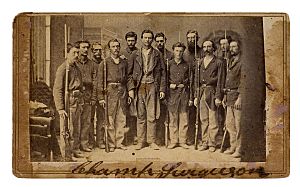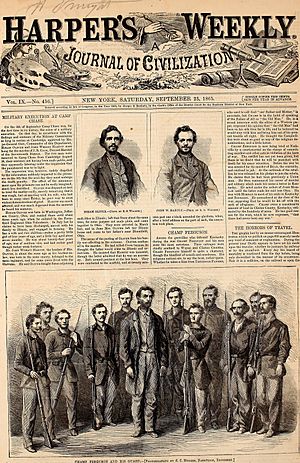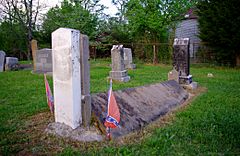Champ Ferguson facts for kids
Quick facts for kids
Samuel Ferguson
|
|
|---|---|
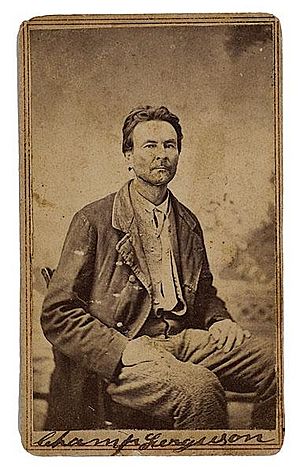
Champ Ferguson in 1865
|
|
| Born | November 29, 1821 Clinton County, Kentucky, U.S.
|
| Died | October 20, 1865 (aged 43) Nashville, Tennessee, U.S.
|
| Cause of death | Execution by hanging |
| Resting place | France Cemetery White County, Tennessee |
| Criminal status | Executed |
| Conviction(s) | War crimes |
| Criminal penalty | Death |
Samuel "Champ" Ferguson (November 29, 1821 – October 20, 1865) was a notorious Confederate guerrilla during the American Civil War. He was arrested, tried, and executed for war crimes by the US government after the war.
Early life
Ferguson was born in Clinton County, Kentucky, on the Tennessee border, the oldest of ten children. This area was known as the Kentucky Highlands and had more families who were yeomen farmers and generally owned few slaves. Like his father, Ferguson became a farmer but also earned a reputation for violence even before the American Civil War.
On August 12, 1858, an altercation that culminated in a feud between Ferguson and the Evans brothers, Floyd and Alexander, resulted in the death of James Reed, the Evans' cousin and acting constable of Fentress County, Tennessee and the near death of Floyd Evans. Both men were injured repeatedly by Ferguson as he attempted to flee mob justice, which the Tennesseans had meant to inflict on Ferguson after cornering him on their side of the border. In the 1850s, Ferguson moved with his wife and family to the Calfkiller River Valley in White County, Tennessee.
Guerrilla activities
During the Civil War, East Tennessee, a mostly mountainous region, opposed secession from the Union. The establishment in the region, for instance, of the "Free and Independent State of Scott" was an example of this. The remainder of the state, which had more slaveholders, particularly in the plantation areas of West Tennessee, supported the Confederacy. The historical division made East Tennessee a target of informal engagements by both sides. Confederate troops fought engagements with local partisans, which took place far from the front. From 1862, Tennessee was occupied by Union troops, which contributed to the tensions and divisions. The mountainous terrain and the lack of law enforcement during the war gave guerrillas and other irregular military groups significant freedom of action. Numerous incidents were recorded of guerrilla and revenge attacks, especially on the Cumberland Plateau. Families were often divided; one of Champ Ferguson's brothers fought as a member of the Union's 1st Kentucky Cavalry and was killed in action.
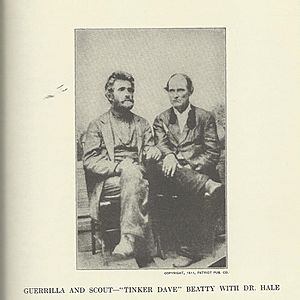
Early in the war, Ferguson organized a guerrilla company and began attacking any civilians that he believed supported the Union. Many local vendettas were prosecuted in occupied Tennessee under the guise of war. His men cooperated with Confederate military units led by Brig. Gen. John Hunt Morgan and Maj. Gen. Joseph Wheeler when they were in the area and some evidence indicates that Morgan commissioned Ferguson as a captain of partisan rangers. Ferguson's men were seldom subject to military discipline and often violated the normal rules of war.
Trial and hanging
At the war's end, Ferguson disbanded his men and returned home to his farm. As soon as the Union troops learned of his return, they arrested him and took him to Nashville, where he was tried by a military court. Ferguson's trial attracted national attention and soon became a major media event. Ferguson insisted this conduct was simply part of his duty as a soldier.
On October 10, 1865, Ferguson was found guilty and sentenced to death.
He was executed on October 20, 1865, one of only two men to be tried, convicted, and executed for war crimes during the Civil War (the other being Captain Henry Wirz, commandant of the infamous Andersonville prison in Georgia). Ferguson was buried in the France Cemetery north of Sparta, White County, Tennessee. This site is now bordered by Highway 84 (Monterey Highway).



